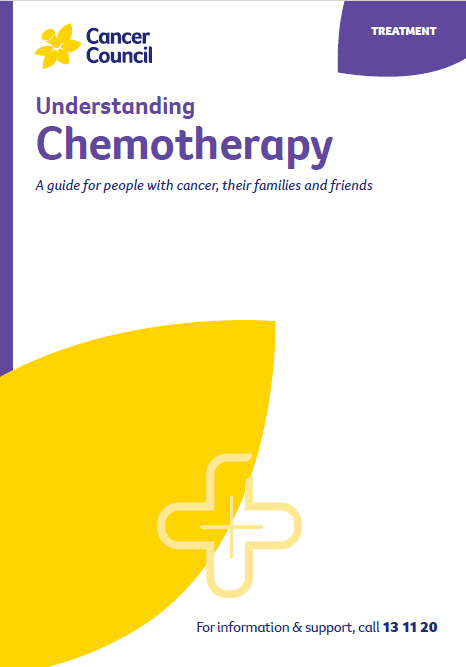- Home
- About Cancer
- Cancer treatment
- Chemotherapy
- Managing side effects
- Blood-related side effects
Blood-related side effects
Blood cells are made in the bone marrow, which is the spongy part in the centre of the bones.
Learn more about:
- Main type of blood cells
- Having blood tests
- Anaemia
- Bleeding problems
- Infections
- Taking care with infections during chemotherapy
Main types of blood cells
The bone marrow makes 3 main types of blood cells, which have specific functions:
- red blood cells – carry oxygen around the body
- white blood cells – fight infection
- platelets – help blood to clot and prevent bruising.
New blood cells are constantly being made in the bone marrow. These rapidly dividing cells can be damaged by chemotherapy, and the number of blood cells (your blood count) will be reduced. Low numbers of blood cells may cause anaemia or bleeding problems, and increase the risk of infections.
Having blood tests
You will have blood tests when you start treatment and before each chemotherapy cycle to check that your blood count is adequate before you have chemotherapy. If your blood count has not recovered, your doctor may delay treatment.
Anaemia
If your red blood cell count drops below normal, this is called anaemia. A reduced amount of oxygen circulates through your body, which can make you feel tired, lethargic, dizzy or breathless. The tips for coping with fatigue may be helpful. To minimise dizziness, take your time when you get up from sitting or lying down.
Your treatment team will monitor your red blood cell levels. Let them know if you have any symptoms of anaemia during your course of chemotherapy. If the levels of red blood cells drop too low, you may need a blood transfusion to build them up again.
For more on this, see Fatigue and cancer.
→ READ MORE: Bleeding problems
More resources
A/Prof Kate Mahon, Director of Medical Oncology, Chris O’Brien Lifehouse, NSW; Katherine Bell, Dietetics Department, Liverpool Hospital, NSW; Brigitta Leben, Dietetics Department, Liverpool Hospital, NSW; Sophie Michele, 13 11 20 Consultant, Cancer Council SA; Dr Jess Smith, Medical Oncologist, Macquarie University Hospital, NSW; Karene Stewart, Consumer; Julie Teraci, Clinical Nurse Consultant, Skin Cancer and Melanoma, Cancer Network WA.
View the Cancer Council NSW editorial policy.
View all publications or call 13 11 20 for free printed copies.

